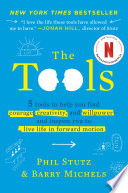I am a big fan of therapy, but not self-help books. Unless you have a photographic memory or somehow succeed in memorizing and practicing the steps suggested in the book, they are not practically helpful. There is an exception to the rule. When Ron Perlman’s Easy Street (The Hard Way): A memoir turned into a commercial for his therapist, Phil Stutz, I decided to immediately check out The Tools: Transform Your Problems Into Courage, Confidence, and Creativity. If a brilliant actor such as Perlman endorses you, anyone can learn something from this therapist.
The Tools: Transform Your Problems Into Courage, Confidence, and Creativity is a writing collaboration between Phil Stutz and Barry Michels, who was a lawyer turned therapist, which added to my enjoyment of the book. The Tools: Transform Your Problems Into Courage, Confidence, and Creativity provides practical steps on how to break destructive cycles and integrates spiritual principles without proselytizing. Normally I hate the use of the word spiritual because I am a Christian, and it feels too nebulous, but The Tools: Transform Your Problems Into Courage, Confidence, and Creativity reminded me of Biblical principles that I already know and adhere to.
There are basically five tools. The first tool is “reversal of deserve,” which you use when you are avoiding something. Basically plow through the fear and pain and go forward. The second tool is “active love.” When you are obsessing about something negative and can’t move on, gather all the love around you (in my case, the love of God from above) and shoot it out at the person like a laser from your heart. You are basically shooting the person with God’s love, which is preferable to any other kind of shooting including shooting your mouth off, which is easier said than done. The third tool is “inner authority.” Embrace the shadow version of you, in my case the ridiculed, nerdy, ugly outcast girl then face your audience. Basically your shadow self makes you stronger and become fully you. The fourth tool is “the grateful flow.” Say five things that make you grateful, focus on the physical sensation of being grateful and feel connected to, in my case, God. The fifth step is “jeopardy.” You imagine yourself on your deathbed and scream not to waste your time. This tool gives you the willpower to not quit and keep using the steps.
Even though this basic summary is comprehensive, you should still read The Tools: Transform Your Problems Into Courage, Confidence, and Creativity to get an idea of when these tools are needed and what it is like to use them. You should not let my use of God deter you. God is how I interpret Stutz and Michels idea of a higher power guiding the universe, but you should read The Tools: Transform Your Problems Into Courage, Confidence, and Creativity yourself to see how you interpret their words. Perlman does not practice Judaism though he has Jewish heritage and was not turned off by Stutz’s advice. The idea is not to convert you to a belief, but tap into something you may already believe about the overarching course of the universe.
As I wrote earlier, the drawback of The Tools: Transform Your Problems Into Courage, Confidence, and Creativity is the problem that all readers of self-help books face. How do you remember all of these steps? I don’t think that you can. I wrote it down. You may buy the book. For me, it did help that I brought my relationship with the Triune God into my reading of it. For you, it may be the beauty and brevity of life. The Tools: Transform Your Problems Into Courage, Confidence, and Creativity is worth your time and can be quite helpful to break self-sabotaging cycles.

The Tools: Transform Your Problems Into Courage, Confidence, and Creativity
Stay In The Know
Join my mailing list to get updates about recent reviews, upcoming speaking engagements, and film news.




